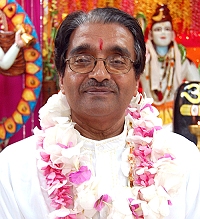From a satsang with Paramacharya of SWAHA, H.H. Pt. Hardeo Persad
In the elaborate canvas of human existence, the purpose of humans transcends the mere pursuit of worldly desires, beckoning towards a profound connection with spirituality. This transformative journey requires the individual ego to harmonise with the Cosmic Ego — an evolution attainable through the transition from ‘agyaan’ (ignorance) to ‘gyaan’ (wisdom). At the heart of this metamorphosis lies the worship of Saraswati Devi, the Goddess of Wisdom, whose divine influence empowers the seeker with Kriyaa Shakti, the energy of enlightened activity.
In the realm of ignorance, one is ensnared by the kleshas (flaws) of egoism, fear of death, attachment and dislikes, leading to the shrouding of intellect with the veil of illusory thinking. Such confusion gives rise to the mistakes of ignorance: mistaking the unreal for the real, the impure for the pure, the ephemeral for the eternal, the painful for the pleasurable, and that which should be discarded for that which should be obtained.
The name ‘Saraswati Devi’ is derived from ‘Saras,’ signifying a lake or pool — a medium facilitating the flow of pure knowledge and creativity. She embodies a spectrum of qualities, from speech and music to arts and creative work. Represented by various names like Vaani, Hansvaahini and Brahmani, Saraswati Devi’s essence purifies the very being of an individual.
The swan, the vehicle of Saraswati Devi, embodies discriminative power, capable of choosing the essential over the mundane, symbolising the ability to avoid the mistakes of ignorance. The predominant white colour in her iconography reflects truth, purity, peace and protection — attributes associated with ‘Sattva guna’ or purity. Saraswati Devi personifies true knowledge, wisdom and creative brilliance.
Vasant Panchami, a festival dedicated to Saraswati Devi, is observed on the fifth day of the bright fortnight of the lunar month of Maagh. This day holds special significance for students, musicians, teachers, and those engaged in learning. However, the worship of Saraswati Devi is not confined to a specific day; it can be performed during the Navraatri period or any other day of Devi worship.
Metaphysically, Saraswati worship holds deep significance, aligning with the Triveni River in India — symbolic of the merging of three bio-energy channels within the subtle body of man. As Gangaa represents ‘bhakti’ or devotion, Yamuna signifies ‘karma’ or selfless action, and Saraswati embodies ‘gyaan’ or wisdom. The worship of Saraswati Devi facilitates the flow of wisdom, guiding one from ignorance to empowerment and self-realisation. As we celebrate Saraswati Jayanti, let us intensify our pursuit of wisdom, advancing towards spiritual liberation.



